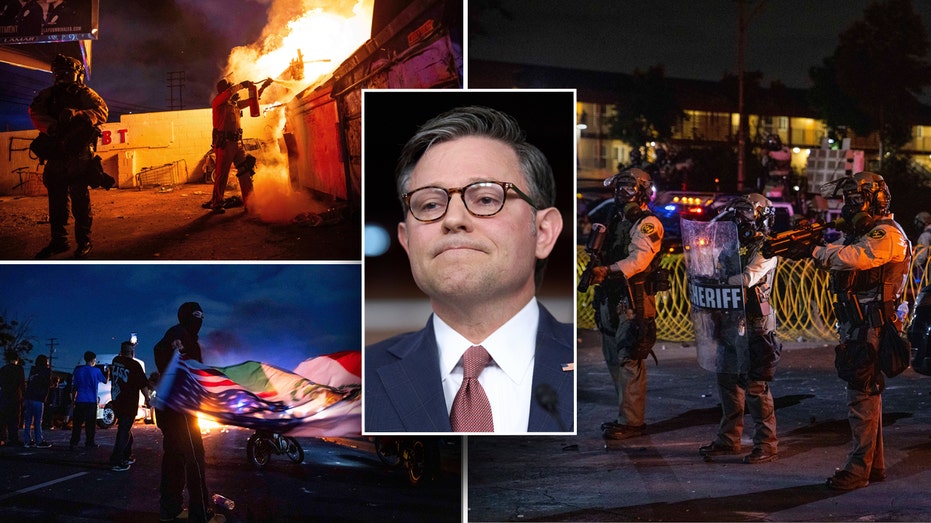Johnson Defends Hegseth's Call to Send Marines to Anti-ICE Riots: A Strategic Move to Deter Violence
House Speaker Johnson pledges Marines' support amid Los Angeles Anti-ICE riots, while President Trump deploys National Guard forces.

House Speaker Mike Johnson, R-La., defended the suggestion by Defense Secretary Pete Hegseth to potentially send U.S. Marines to Los Angeles to address escalating anti-Immigration and Customs Enforcement (ICE) riots, asserting on Sunday that such a move would not constitute a heavy-handed response. Speaking in an interview, Johnson reaffirmed President Donald Trump's recent action of sending National Guard troops to the city to protect federal personnel and property amid ongoing violence and unrest.
President Trump signaled a willingness to take further steps, expressing he would consider federalizing the California National Guard should local officials—Governor Gavin Newsom and Los Angeles Mayor Karen Bass—fail to quell the disorder. "I have no concern about that at all," Johnson remarked. He emphasized the federal responsibility to uphold the rule of law when local authorities are perceived as unable or unwilling to do so. "That’s real leadership, and he has the authority and the responsibility to do it," Johnson added, defending the president's actions as necessary and appropriate under the circumstances.
The situation escalated following Defense Secretary Hegseth’s statement on Saturday, indicating that the Department of Defense was mobilizing National Guard forces "immediately" and placing active-duty Marines at Camp Pendleton on high alert should violence persist. Johnson endorsed this stance, stating, "One of our core principles is maintaining peace through strength... I don’t think that’s heavy-handed. I think that’s an important signal." He suggested the mere prospect of deploying Marines could deter further unrest.
Governor Newsom responded critically, calling Hegseth's remarks "deranged behavior" and decrying the idea of deploying active-duty military against American citizens. Hegseth retorted, asserting there was "zero tolerance for attacking federal agents who are doing their job," and reiterated, "The National Guard, and Marines if need be, stand with ICE."
Hegseth characterized the violent protests as deliberate attempts to prevent the removal of "Criminal Illegal Aliens" and linked the unrest to foreign criminal organizations, describing the situation as a "huge NATIONAL SECURITY RISK." He vowed that, under President Trump, "violence & destruction against federal agents & federal facilities will NOT be tolerated."
The debate over deploying military personnel on U.S. soil raises complex legal considerations. Typically, the U.S. military is prohibited from engaging in domestic law enforcement except during emergencies. The main legal mechanism for such deployments is the 18th-century Insurrection Act, which allows the president to activate the military or National Guard during times of rebellion or civil unrest. Notably, Trump has not invoked the Insurrection Act in this present situation.
Instead, the president has relied on a federal statute, 10 U.S.C. 12406, to federalize National Guard troops temporarily to protect federal personnel and property. This law permits such activation under threats of invasion, rebellion, or inability to execute federal law, typically requiring orders to be issued through state governors. However, ambiguity remains regarding whether the president can bypass a governor’s consent for such a deployment, highlighting ongoing uncertainty in the use of federal versus state military authority in domestic crises.
The National Guard itself represents a unique entity, capable of serving both state and federal missions. However, under the Posse Comitatus Act, regular military personnel are strictly limited from participating in civilian law enforcement unless specifically authorized by Congress or the Constitution—a safeguard put in place after the Civil War to limit federal power over domestic affairs.
This latest confrontation in Los Angeles echoes past incidents, including the 2020 civil unrest, when President Trump threatened, but ultimately refrained from invoking the Insurrection Act. His administration did, however, deploy federal agents to several cities, resulting in tense standoffs between protestors and law enforcement, most visibly in Portland, Oregon, where sustained violence targeted federal buildings for weeks on end.




